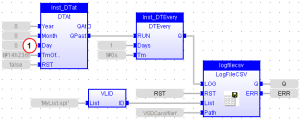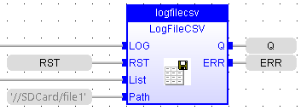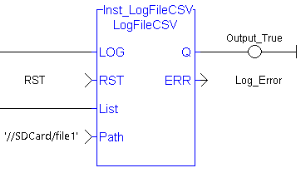LogFileCSV
![]()
 Function Block
Function Block![]() A function block groups an algorithm and a set of private data. It has inputs and outputs. - Create a log file in CSV format for a list of variables.
A function block groups an algorithm and a set of private data. It has inputs and outputs. - Create a log file in CSV format for a list of variables.
Inputs
|
Input |
Data Type |
Range |
Unit |
Default |
Description |
|---|---|---|---|---|---|
|
LOG |
BOOL |
|
|
|
Variables are saved on any rising edge |
|
RST |
BOOL |
|
|
|
Reset the contents of the CSV file. |
|
LIST |
DINT |
|
|
|
ID of the list of variables to log (use VLID function). |
|
PATH |
STRING |
|
|
|
Path name of the CSV file (PxMM flash memory, SD card, or Shared Directory). |
Outputs
|
Output |
Data Type |
Range |
Unit |
Description |
|---|---|---|---|---|
|
Q |
BOOL |
|
|
TRUE if the requested operation has been performed without error. |
|
ERR |
DINT |
|
|
Error report for the last requested operation. 0 (zero) is OK. |
Remarks
-
-
Calling this function can lead to missing several PLC
 "Programmable Logic Controller"
A Programmable Logic Controller, PLC, or Programmable Controller is a digital computer used for automation of industrial processes, such as control of machinery on factory assembly lines.
Used to synchronize the flow of inputs from (physical) sensors and events with the flow of outputs to actuators and events cycles.
"Programmable Logic Controller"
A Programmable Logic Controller, PLC, or Programmable Controller is a digital computer used for automation of industrial processes, such as control of machinery on factory assembly lines.
Used to synchronize the flow of inputs from (physical) sensors and events with the flow of outputs to actuators and events cycles.
Files are opened and closed directly by the target's Operating System.
Opening some files may be dangerous for system safety and integrity.
The number of open files may be limited by the target system.
-
-
- Opening a file may be unsuccessful (invalid path or file name, too many open files...).
Your application has to process such error cases in a safe way. - File management may be not available on some targets.
- See the OEM
 "Original equipment manufacturer"
A term that refers to containment-based re-branding, namely where one company uses a component of another company within its product, or sells the product of another company under its own brand. OEM refers to the company that originally manufactured the product instructions for more information about available features.
"Original equipment manufacturer"
A term that refers to containment-based re-branding, namely where one company uses a component of another company within its product, or sells the product of another company under its own brand. OEM refers to the company that originally manufactured the product instructions for more information about available features.
- See the OEM
- Valid paths for storing files depend on the target implementation.
- See the OEM instructions for more information about available paths.
- Opening a file may be unsuccessful (invalid path or file name, too many open files...).
- This function enables to log values of a list of variables in a CSV file.
- On each rising edge of the LOG input, one more line of values is added to the file.
- There is one column for each variable, as they are defined in the list.
- The list of variables is prepared using the KAS IDE
 "Integrated development environment"
An integrated development environment is a type of computer software that assists computer programmers in developing software.
IDEs normally consist of a source code editor, a compiler and/or interpreter, build-automation tools, and a debugger or a text editor.
"Integrated development environment"
An integrated development environment is a type of computer software that assists computer programmers in developing software.
IDEs normally consist of a source code editor, a compiler and/or interpreter, build-automation tools, and a debugger or a text editor. - Use the VLID function to get the identifier of the list.
- On a rising edge of the RST command, the file is emptied.
- When a LOG or RST command is requested, the Q output is set to TRUE if successful.
- See What is the Difference between Q and OK? for more information.
- In case of error, a report is given in the ERR output.
- Possible error values are:
- 1 = Cannot reset file on a RST command.
- 2 = Cannot open file for data storing on a LOG command.
- 3 = Embedded lists are not supported by the runtime
 In computer science, runtime (or run-time) describes the operation of a computer program, the duration of its execution, from beginning to termination (compare compile time).
Within KAS, runtime also refers to the virtual machine that manage the program written in a computer language while it is running.
In computer science, runtime (or run-time) describes the operation of a computer program, the duration of its execution, from beginning to termination (compare compile time).
Within KAS, runtime also refers to the virtual machine that manage the program written in a computer language while it is running. - 4 = Invalid list ID.
- 5 = Error while writing to file.
- Possible error values are:
- Combined with real time clock management functions, this block provides a very easy way to generate a periodical log file.
This example shows a list and a program that log values everyday at 14h23m (2:23 pm) (see call out  ).
).
FBD Language
FFLD Language
IL Language
(* MyLOG is a declared instance of LogFileCSV function block *)
Op1: CAL MyLOG (b_LOG, RST, LIST, PATH);
FFLD MyLOG.Q
ST"Structured text" A high-level language that is block structured and syntactically resembles Pascal Q
FFLD MyLog.ERR
ST ERR
ST Language
(* MyLOG is a declared instance of LogFileCSV function block *)
MyLOG (b_LOG, RST, LIST, PATH);
Q := MyLOG.Q;
ERR := MyLog.ERR;
See Also









